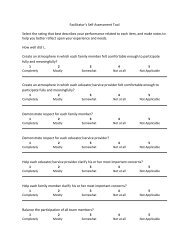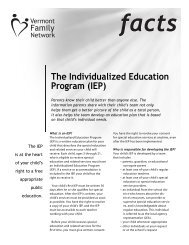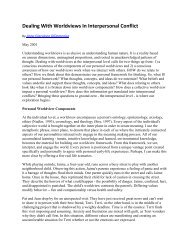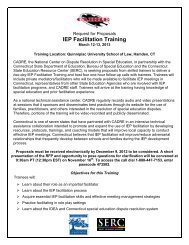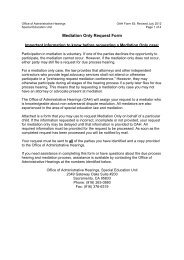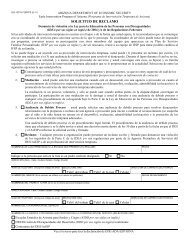Parental Rights Brochure - Direction Service
Parental Rights Brochure - Direction Service
Parental Rights Brochure - Direction Service
- No tags were found...
You also want an ePaper? Increase the reach of your titles
YUMPU automatically turns print PDFs into web optimized ePapers that Google loves.
Parents Have <strong>Rights</strong>Parents of children with disabilities from threeyears of age through age twenty-one have specificrights under the Individuals with DisabilitiesEducation Act. These rights are sometimes calledprocedural safeguards. Individuals serving assurrogate parents and students aged eighteen orover receiving special education services also areentitled to these procedural safeguards, known asthe “Notice of Procedural Safeguards.”Additional InformationThis notice is an abbreviated summary ofprocedural safeguards under federal and state laws.The entire parent’s due process rights are availableon the Georgia Department of Education website atwww.doe.k12.ga.usTo obtain more information about parentalrights or dispute resolution including how to filea complaint, contact the Georgia Departmentof Education, Divisions for Special Education<strong>Service</strong>s and Supports at (404) 656-3963 or at1-800-311-3627 and ask for Special Education.You may also send correspondence to:Parents’ <strong>Rights</strong>:A Brief Summaryof ProceduralSafeguardsFor students with disabilities receivingspecial education servicesTeacher or Administrative Involvement isImportantA number of people in your child’s systemand special education department can answerquestions about your child’s education and yourrights as a parent. When you have a concern, itis important that you contact your child’s teachersor administrators to talk about your child and anyproblems you see. This informal conversationoften solves the problem and helps maintain opencommunication.Parent Participation Is ImportantYou must be given the opportunity to participatein all meetings during which decisions willbe made about your child’s special educationservices. You have the right to participate inmeetings about the identification, assessment,educational placement, and other matters relatedto your child’s education. If you are unable toattend, you may request to participate over thephone or to have the meeting changed.Under certain conditions, a surrogate parent maybe assigned to represent a child with a disabilitywhen a parent cannot be identified or located.Georgia Department of EducationDivisions for Special Education<strong>Service</strong>s and Supports1870 Twin Towers East205 Jesse Hill Jr. Drive SEAtlanta, GA 30334Fax: 404-651-6457Web site: http://www.gadoe.org/ci_exceptional.aspxIn accordance with State and Federal law, theGeorgia Department of Education prohibitsdiscrimination on the basis of race, color, religion,national origin, sex, disability, or age in itseducational and employment activities. Inquiriesregarding the application of these practices may beaddressed to the General Counsel of the GeorgiaDepartment of Education, 2052 Twin Towers East,Atlanta, Georgia, 30334, (404) 656-2800.We will lead the nationin improving student achievement.DIVISIONS FOR SPECIAL EDUCATIONSERVICES AND SUPPORTS
What are Parent's <strong>Rights</strong>in Georgia Special Education?Parents and students over age eighteen have the right . . .To ParticipateYou have the right to refer your child for specialeducation services, to help with creating thedevelopment of the individualized educationprogram (IEP), and to be informed of all programoptions and alternatives, both public and nonpublic.To receive Prior Written NoticeYou have a right to get notified in your nativelanguage when the school system initiates a changein the identification, assessment, or educationalplacement in special education. In Georgia, theIEP may serve as prior written notice.To ConsentYou must sign an agreement before your child isassessed or provided with any special educationservices. You must also provide consent beforeany change in special education placement occurs.In addition, you must provide consent in mostsituations before the school releases informationabout your child to others.To Refuse ConsentYou may refuse evaluation for or placement of yourchild in special education or the other situationsdescribed above.To be Given Nondiscriminatory AssessmentYour child must be tested for special education inways that are fair to your child, which means thattests cannot be discriminatory or culturally biased.To Receive Independent EducationalAssessmentsYou may get an independent educationalevaluation for your child at the public’s expenseif you do not agree with the school system’sevaluation. The school system must help you geta second opinion if you ask them. If the systembelieves that an independent evaluation is notneeded, it may ask for a hearing to prove that thesystem’s assessment is appropriate.To Access Your Educational RecordsYou have the right to look at and get copies ofyour child’s educational records.To Stay in the Current Program if There Is aDisagreement About PlacementIf you disagree with the system regarding yourchild’s special education placement or proposedchange in placement, the law requires the studentto “stay put” in the current program until thedisagreement is resolved.To Be Given a Hearing Regarding DisagreementsAbout an IEPYou have the right to file a request for DueProcess Hearing related to the provision ofa free appropriate public education for yourchild. You have the right to have an attorney,an advocate, and the student present at the DueProcess Hearing; and to make the hearing public.Under certain conditions, the hearing officermay award, reduce, or deny the reimbursementof attorney’s fees and fees paid to nonpublicinstitutions by parents in the settlement of a case.To request a Due Process Hearing or to receive acomplete notice of procedural safeguards relatedto fair hearing, contact the Divisions for SpecialEducation <strong>Service</strong>s and Supports or your localschool system.To Participate in a Resolution SessionYou have the right to be part of a resolution sessionthat gives parents and school systems a chance tosettle any issues in the due process complaint. Inthis way, parents and school systems may avoid aDue Process Hearing and give immediate benefitto the child. If parents and the school reach anagreement, they both must sign a legally bindingagreement. If it is not settled, the parents andschool may go to a Due Process Hearing.To Receive MediationYou are also encouraged to consider settlingdisagreements regarding your child’s specialeducation program through voluntary mediation, aprocess through which parents and systems try tofind a solution to which both can agree with the helpof an impartial mediator. You can seek mediationseparate from due process, or you can participatein mediation prior to a Due Process Hearing.Mediation cannot be used to delay your right to aDue Process Hearing.To File A Complaint Against Your School SystemIf you believe that your child’s school systemhas not complied with the laws, you may filea complaint with the Georgia Department ofEducation.The Department must investigate the complaint andissue a written report of findings within 60 days ofreceiving the complaint.To Be Informed of School Discipline and AlternativePlacementThere are specific rules regarding suspensions andexpulsions of students with IEPs. Generally, a studentwith a disability may be suspended or placed in analternative educational setting to the same extent thatthese options apply to students without disabilities.If your child is in such a placement for more than10 days, an IEP meeting must be held to considerthe appropriateness of your child’s current placementand the extent to which the disability is the causeof the misconduct. Regardless of your child’splacement, the system must provide a free appropriateeducational program for your child.To Be Informed of Policies Regarding ChildrenWho Attend Private SchoolsChildren who are enrolled by their parents in privateschools may participate in some publicly fundedspecial education programs. Although school systemshave clear responsibility to offer a free appropriatepublic education to students with disabilities, recentchanges in federal law have greatly lessened theschool systems responsibility to provide services tostudents who have been enrolled in private schools.



